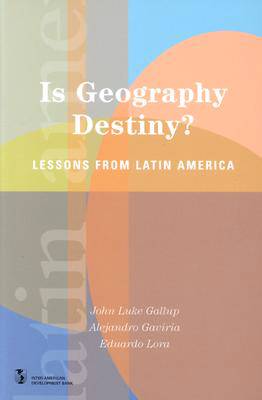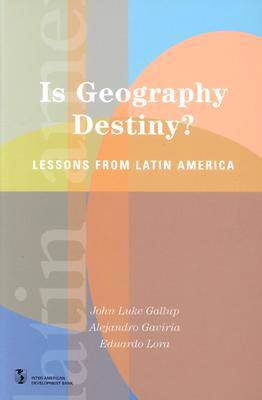
- Afhalen na 1 uur in een winkel met voorraad
- Gratis thuislevering in België vanaf € 30
- Ruim aanbod met 7 miljoen producten
- Afhalen na 1 uur in een winkel met voorraad
- Gratis thuislevering in België vanaf € 30
- Ruim aanbod met 7 miljoen producten
Is Geography Destiny?
Lessons from Latin America
Omschrijving
Geographic interpretations of development recently have become the subject of much renewed interest and debate within scholarly and public policy circles. Focusing on Latin America, this book examines how physical and human geography has influenced the region's potential for economic and social development.
The book assesses how geography affects differences in development between countries and more specifically between Latin America and other regions of the world. The effects of geography on regional development are examined through four channels: the productivity of land, health conditions, frequency and intensity of natural disasters, and access to markets. The book then explores how geography has influenced development within countries through case studies of Bolivia, Brazil, Colombia, Mexico, and Peru-countries significant for their geographical diversity as well as their wide socioeconomic disparities. These case studies illustrate numerous exceptions to international patterns and prove that while geography matters, it need not determine a country's destiny.
Using the knowledge gained from these two perspectives, the book concludes with recommendations for policies that can help countries overcome the limitations imposed by geography and thereby enhance their potential for economic and social development.
Specificaties
Betrokkenen
- Uitgeverij:
Inhoud
- Aantal bladzijden:
- 188
- Taal:
- Engels
- Reeks:
Eigenschappen
- Productcode (EAN):
- 9780804749275
- Verschijningsdatum:
- 26/09/2003
- Uitvoering:
- Paperback
- Formaat:
- Trade paperback (VS)
- Afmetingen:
- 152 mm x 231 mm
- Gewicht:
- 272 g

Alleen bij Standaard Boekhandel
Beoordelingen
We publiceren alleen reviews die voldoen aan de voorwaarden voor reviews. Bekijk onze voorwaarden voor reviews.










